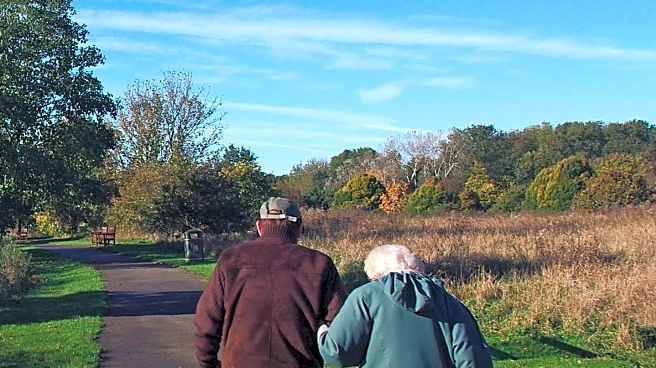What's Happening?
A recent study conducted by the Harvard Aging Brain Study has revealed that walking between 3,000 to 5,000 steps daily can significantly slow cognitive decline in older adults at risk for Alzheimer's disease. The research, published in Nature Medicine,
involved 296 participants aged 50 to 90, who were monitored over a period of up to 14 years. These individuals, who showed molecular signs of Alzheimer's but no cognitive symptoms at the study's onset, demonstrated a slower rate of mental decline when engaging in regular walking. The study found that those who walked 5,000 to 7,500 steps per day experienced a cognitive decline delay of up to 7 years. The research highlights the potential of moderate physical activity in managing Alzheimer's progression.
Why It's Important?
This study underscores the importance of physical activity in mitigating the effects of Alzheimer's disease, a condition affecting millions of Americans. By demonstrating that even moderate exercise can have significant benefits, the findings offer a practical and accessible strategy for older adults to maintain cognitive health. This could lead to a shift in public health recommendations, emphasizing the role of daily physical activity in preventing or delaying the onset of Alzheimer's. The implications are particularly relevant for healthcare providers and policymakers focused on aging populations, as they seek cost-effective interventions to address the growing burden of neurodegenerative diseases.
What's Next?
The study's findings may prompt further research into the specific mechanisms by which physical activity influences brain health, potentially leading to new therapeutic approaches. Healthcare professionals might begin to incorporate step-count goals into treatment plans for patients at risk of Alzheimer's. Additionally, public health campaigns could be developed to encourage older adults to engage in regular walking as a preventive measure. As awareness of these benefits spreads, there may be increased demand for community programs and infrastructure that support walking and other forms of physical activity for seniors.
Beyond the Headlines
The study also raises questions about the broader societal and economic impacts of promoting physical activity among older adults. By potentially reducing the incidence of Alzheimer's, such interventions could alleviate some of the financial strain on healthcare systems and families. Moreover, the findings highlight the need for inclusive health strategies that consider the varying physical capabilities of older adults, ensuring that exercise recommendations are both achievable and effective for diverse populations.















